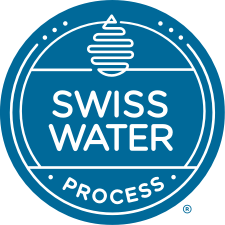Key Takeaways About Decaf Coffee and Your Health (TL;DR)
- Antioxidants: Swiss Water® Decaf preserves beneficial compounds like chlorogenic acids and polyphenols, known antioxidants that can contribute to heart health, thanks to its chemical-free process.
- Cholesterol: Coffee oils can have a slight impact on cholesterol. Research shows that you can reduce the presence of these cholesterol-boosting oils by choosing a paper filter brew method.
- Acidity: Decaf coffee has slightly lower acidity than regular. Try reducing the amount of acidity by choosing Swiss Water® Decaf, darker roasts, or cold brewing.
- Blood Sugar: Plain black coffee generally does not cause a significant immediate change in blood sugar levels. However, caffeine can cause an immediate spike in blood sugar; decaf's effect is much milder.
- Final Word: Consult your doctor to determine the best coffee choice for your individual health needs.

We often get questions about the health benefits of Swiss Water® decaffeinated coffee. So we're answering the top 4 questions coffee lovers ask about Swiss Water® Process decaf, covering topics like cholesterol, antioxidants, acidity, and blood sugar levels.
Question #1: Are Swiss Water® Decaf coffees still high in antioxidants?
One great thing about the Swiss Water decaffeination process is that it leaves so many of coffee's vital compounds, like chlorogenic acids and polyphenols, intact in the coffee bean itself. These compounds are considered by many to be antioxidants, and are thought to contribute to good heart health and to prevent cardiovascular disease when consumed in moderation. We’re proud to say our chemical-free process preserves these beneficial parts of coffee!
Question #2: Does decaf coffee impact cholesterol levels?
All coffee, regardless of caffeine content, contains the natural compounds cafestol and kahweol. These compounds in coffee, when not brewed with a paper filter, have been shown to increase cholesterol levels in some individuals, regardless of whether caffeine is removed. Research shows that you can reduce the presence of these cholesterol-boosting oils by choosing a paper filter brew method. For example, choose a standard coffee maker, pour-over, or an AeroPress using a paper filter, rather than methods that use a metal screen, if you are concerned about cholesterol.
Question #3: Is decaf coffee lower in acid than fully caffeinated coffee?
Coffee can cause gastro-oesophageal reflux, however that is an effect that is less pronounced after decaffeination. The difference often isn't enough for those seeking a truly low-acid cup. To minimize stomach discomfort, we suggest implementing three strategies: choose a Swiss Water® Process decaf coffee, select darker roasts, and/or use low-acid brewing methods such as cold brew. If you are looking for tips on how to make cold brew coffee, check out our friends at Café Grumpy and Stumptown for their helpful guides for at-home cold brewing.
Question #4: How does decaf coffee affect blood sugar levels?
Plain black coffee (without added sugar, dairy, or dairy alternatives) generally does not cause a significant immediate change in blood sugar levels. In fact, the long-term effects of coffee are largely beneficial. Compounds like polyphenols are consistently linked to a reduced risk of developing Type 2 Diabetes (T2D). Research, including this 2021 study, finds that even increasing daily consumption by one cup helps lower T2D risk.
However, the relationship is complex due to a short-term effect:
- Studies have found that coffee of any kind does have an acute effect on glucose metabolism, temporarily reducing insulin sensitivity, which may cause spikes.
- Decaf coffee has a milder effect compared to caffeinated coffee because it contains significantly less caffeine.
As managing diabetes involves both short-term and long-term attention to blood sugar, it will be an individual matter to decide what level of caffeine intake works best for each coffee drinker.
Finding A Healthy Coffee Consumption Balance
At the end of the day, it should be a personal decision between you and your doctor about how much coffee—decaffeinated or not—is right for your own body, risk factors, and lifestyle. We're proud to offer a chemical-free choice for coffee lovers who want to reduce caffeine in their lives for any reason, and are even prouder that Swiss Water® decaf retains many of coffee's most health-benefiting compounds—and of course that it tastes delicious! We join you in raising a cup of decaf to your health!

